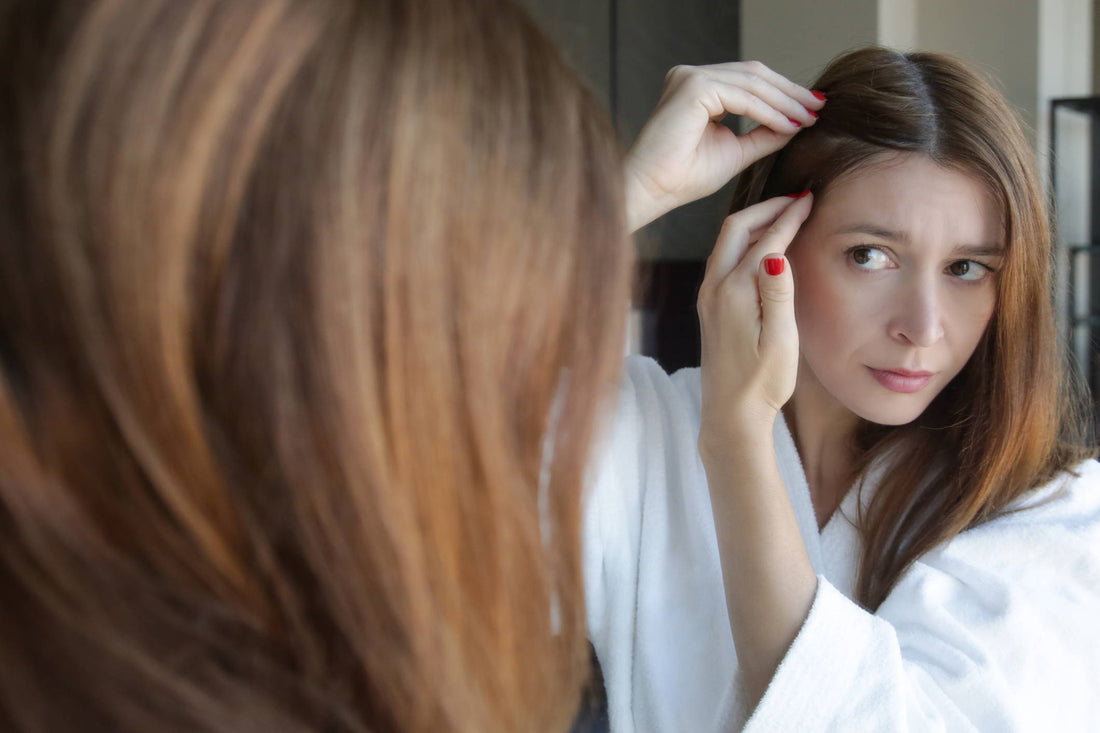Postpartum is an incredible time of healing and change in a woman’s body. After months of growing a baby (or two), the body uses this period to nourish the baby and also recover from pregnancy and birth. Along with the expected physical changes that occur in postpartum, many women also see a big change in their hair, and unfortunately, it isn’t always favorable. Hair loss is a common side effect of childbirth. To combat postpartum hair loss, many women seek out breastfeeding-safe ways to keep their hair healthy, and one of the most common questions we get is, “does biotin help with postpartum hair loss?” Here is what we know about biotin.
Why Does Hair Fall Out in Postpartum?
Before jumping into all things biotin, it is important to understand why women in postpartum experience hair loss in the first place. During pregnancy, changes in hormone levels affect the hair growth cycle by prolonging the anagen or growing phase. This means that you keep the hair on your head for longer. Pregnant women also experience increased blood volume, which can enhance blood flow to the scalp. And, because pregnant women are encouraged to eat healthily, get plenty of good calories, and take prenatal vitamins, they usually have a pretty good nutritional status.
All of these factors combined can give pregnant women a beautiful, full head of hair for the duration of the pregnancy. However, once a baby is born, hormone levels shift dramatically, breastfeeding can pull nutrients away from the mother, and sleep is hard to come by. In general, postpartum can be pretty demanding on a mother's body, so coupled with hormonal changes, the stress of new motherhood can affect your hair growth.
What is more, those changes in hormone levels affect the hair growth cycle, which forces many of the hairs that should have been shed during pregnancy to fall out all at once. As a result, most mothers notice their hair falls out around three months after delivery.
What Does Biotin Do?
Biotin is part of the B vitamin family. Known as B7, this vitamin stimulates keratin production and may also increase the rate that hair follicles grow. We get most of our biotin from our diet, as our bodies cannot make it on our own. And, because it does not stay in our body for long, you have to eat foods containing biotin pretty regularly. You can find biotin in the following foods:
- Meat
- Fish
- Eggs
- Seeds
- Nuts
- Vegetables
You will find biotin in supplements as well. Indeed, it is one of the key ingredients in many skin, hair, and nail supplements, and you can also find it sold individually as either a capsule, pill, or chewable.
Surprisingly, biotin is also formulated into some hair care products like shampoos. So to give your hair the most support, you may benefit from getting plenty of biotin through your diet or supplements and also using shampoos that contain it.
How Much Biotin Should You Take Every Day?
Adults should aim to get around 30 mcg per day. However, breastfeeding women may benefit from getting an extra 5 mcg per day on top of this, as they lose nutrients through their breast milk. Before taking a biotin supplement, it is important to consult your doctor to be sure it is safe for you and your baby.
If you prefer to rely on diet to increase your biotin intake, focus on getting plenty of the biotin-rich foods listed above. Fortunately, these food sources are also rich in protein, and some of these foods, like nuts, fish, and seeds, may also contain omega-3 and omega-6 fatty acids. Protein and omega fatty acids are vital for healthy hair growth as well.
Is it safe to take with breastfeeding?
Few studies look at the safety of certain supplements while breastfeeding. Therefore, it is always best to consult your doctor and your baby’s doctor before increasing your intake of any supplement.
When you talk to your doctor, don’t hesitate to share your concerns about postpartum hair loss. If you have severe hair loss, it may be related to something else aside from hormonal shifts following delivery. For example, it may be due to postpartum thyroiditis or a nutrient deficiency. While some hair loss is expected, your doctor should know if you find it alarming or concerning.

